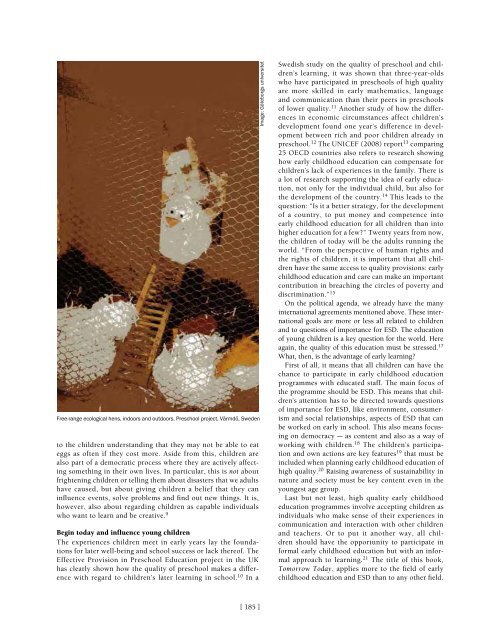Tomorrow today; 2010 - unesdoc - Unesco
Tomorrow today; 2010 - unesdoc - Unesco
Tomorrow today; 2010 - unesdoc - Unesco
Create successful ePaper yourself
Turn your PDF publications into a flip-book with our unique Google optimized e-Paper software.
Free-range ecological hens, indoors and outdoors. Preschool project, Värmdö, Swedento the children understanding that they may not be able to eateggs as often if they cost more. Aside from this, children arealso part of a democratic process where they are actively affectingsomething in their own lives. In particular, this is not aboutfrightening children or telling them about disasters that we adultshave caused, but about giving children a belief that they caninfluence events, solve problems and find out new things. It is,however, also about regarding children as capable individualswho want to learn and be creative. 9Begin <strong>today</strong> and influence young childrenThe experiences children meet in early years lay the foundationsfor later well-being and school success or lack thereof. TheEffective Provision in Preschool Education project in the UKhas clearly shown how the quality of preschool makes a differencewith regard to children’s later learning in school. 10 In aImage: Göteborgs universitetSwedish study on the quality of preschool and children’slearning, it was shown that three-year-oldswho have participated in preschools of high qualityare more skilled in early mathematics, languageand communication than their peers in preschoolsof lower quality. 11 Another study of how the differencesin economic circumstances affect children’sdevelopment found one year’s difference in developmentbetween rich and poor children already inpreschool. 12 The UNICEF (2008) report 13 comparing25 OECD countries also refers to research showinghow early childhood education can compensate forchildren’s lack of experiences in the family. There isa lot of research supporting the idea of early education,not only for the individual child, but also forthe development of the country. 14 This leads to thequestion: “Is it a better strategy, for the developmentof a country, to put money and competence intoearly childhood education for all children than intohigher education for a few?” Twenty years from now,the children of <strong>today</strong> will be the adults running theworld. “From the perspective of human rights andthe rights of children, it is important that all childrenhave the same access to quality provisions: earlychildhood education and care can make an importantcontribution in breaching the circles of poverty anddiscrimination.” 15On the political agenda, we already have the manyinternational agreements mentioned above. These internationalgoals are more or less all related to childrenand to questions of importance for ESD. The educationof young children is a key question for the world. Hereagain, the quality of this education must be stressed. 17What, then, is the advantage of early learning?First of all, it means that all children can have thechance to participate in early childhood educationprogrammes with educated staff. The main focus ofthe programme should be ESD. This means that children’sattention has to be directed towards questionsof importance for ESD, like environment, consumerismand social relationships, aspects of ESD that canbe worked on early in school. This also means focusingon democracy – as content and also as a way ofworking with children. 18 The children’s participationand own actions are key features 19 that must beincluded when planning early childhood education ofhigh quality. 20 Raising awareness of sustainability innature and society must be key content even in theyoungest age group.Last but not least, high quality early childhoodeducation programmes involve accepting children asindividuals who make sense of their experiences incommunication and interaction with other childrenand teachers. Or to put it another way, all childrenshould have the opportunity to participate informal early childhood education but with an informalapproach to learning. 21 The title of this book,<strong>Tomorrow</strong> Today, applies more to the field of earlychildhood education and ESD than to any other field.[ 185 ]

















